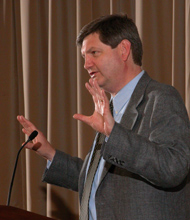3:35 p.m., May 8, 2003--James Risen, Pulitzer Prize winner and intelligence reporter for The New York Times, spoke on his new book, "The Main Enemy: The Inside Story of the CIA's Final Showdown with the KGB," and signed advance copies of it at UD Wednesday evening, May 7, in Clayton Hall.
 |
| Pulitzer Prize-winning reporter James Risen |
Risen, who coauthored the book with former CIA agent Milt Bearden, said "The Main Enemy" is an inside look at CIA-KGB relations as told through the stories of the operatives who lived them. Risen is well-known for his extensive coverage of intelligence operations and won the Pulitzer Prize in 2002 as part of a New York Times reporting team that covered the Sept. 11, 2001, terrorist attacks on New York. His speech was part of UD's Global Agenda Lecture Series, "Spies, Lies and Sneaky Guys."
Risen said when he started out as a reporter he never imagined he would cover national security issues, but boredom with reporting on business and the economy prompted him to ask for another assignment, which led him to the world of spies and intelligence. He said he quickly discovered how difficult his new beat would be.
"I cover a secretive world where you can go to jail for talking to a reporter. There are no press conferences or press rooms, and there's an extensive security process to even get into the building," he said. "It's an area very few reporters have an interest in covering full-time."
Despite such barriers, Risen pressed on and finally got the interviews he had been waiting for several years after the United State's Cold War with Russia ended in 1989 and many agents were unhappy with CIA politics.
"There was internal feuding and budget cuts because the end of the Cold War was changing [the CIA's] approach to intelligence," he said. "All the people who fought the Cold War were leaving the CIA and they were bitter about the way they were being shown the door.
"Some of them for the very first time in their lives wanted to have someone to tell their story to. Their heads were stewing but filled with secrets. Once you got past the bitterness and the anger, they had some fascinating stories to tell."
Risen said KGB agents followed suit and also began to talk because many of them felt they were being held responsible for the horrible events that occurred during the collapse of the Soviet Union.
The combination of these events and interviews led to what Risen calls the "genesis" of his book, "The Main Enemy." He said he coauthored it because he felt that there was not one narrative of how intelligence fit together during the Cold War.
"No one had gotten into the intelligence operations that were going on while we were all sitting at home watching CNN," he said.
Discovering how closely the CIA and KGB worked together at times “stunned” him, Risen said.
Risen cited the Gavrilof Channel, a secret communications telephone line that connected the CIA and KGB, as an example. He said whenever one agency needed to talk to the other because of a scandal, they would call and say, 'May I please speak to Gavrilof?' The line resulted in many back-channel conversations that helped each agency understand the gist of what might be happening.
"What you begin to realize is through intelligence officers, CIA operatives and KGB operatives, you get a kind of sideways glance at a stage show," he said. "They're the guys behind the curtains or in the back row piecing information together.
"We can go for 20 years and think we know what the truth is and then constantly be surprised because something else always comes up. There are always layers upon layers in these spy cases, and it's extremely hard to find the truth."
UD's Global Agenda Lecture Series is part of the University's Global Community Initiative and is presented in association with the World Affairs Council of Wilmington. For information about the final lecture in the series, set May 21, visit [www.udel.edu/global] or call 831-2355.
Article by Amie Voith, AS 2003
Photo by Duane Perry
|

